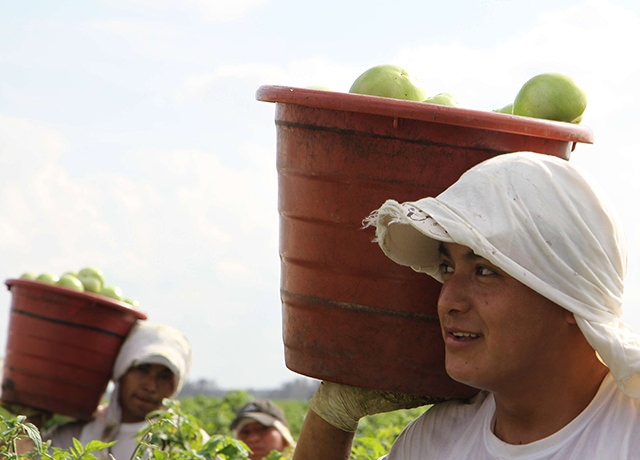
Workers carry buckets of produce on their shoulders. (Fair Food Program)

Workers carry buckets of produce on their shoulders. (Fair Food Program)
In discussions of the sustainability of agriculture, we tend to focus on water, land, consumers, and biodiversity. We study how agriculture impacts the natural environment, and we worry about how we will feed the future. We forget about farmworkers.
It is estimated that there are 3 million migrant farmworkers in the United States, accounting for 42 percent of all farmworkers. Dependent as they are on the farms that employ them, many farmworkers face poor working conditions, starvation wages, and sexual abuse. Some cases of farmworker abuse have even earned the title “modern day slavery” due to conditions such as forced labor, physical abuse, confinement, and debt bondage.
Even without such extreme cases, farmworkers still encounter abhorrent conditions as the most disenfranchised cogs in a severely dysfunctional system. The average total family income for farmworkers ranges from $17,500 to $19,999, far below the U.S. poverty line, and many do not have access to social services due to their undocumented status.
And because barriers of language, power, and privilege keep them from the decision-making table on agricultural, environmental, and labor issues, they face these hardships silently and without the backing of the green community or the people who benefit from their work.
Enter the Fair Food Program, a partnership started in Florida by the Coalition of Immokalee Workers to give farmworkers more agency, more protections, and a louder voice to advocate for what they need. It has partnered with 14 businesses, including McDonald’s and Walmart, and formed legally binding agreements in which buyers commit to paying a fair food premium and suspending purchases from growers who have failed to follow the program’s rules. Most of Florida’s tomato growers participate in the program, as well as some others along the east coast and some growers of strawberries and peppers.
The Fair Food Program is led by and for farmworkers. The Coalition of Immokalee Workers leads worker-to-worker education sessions and educates workers on their rights in hopes of reducing worker abuse. There is a toll-free bilingual complaint line in operation 24 hours a day, 7 days a week for workers to report possible violations of the code of conduct. Complaints are actively investigated, and all steps of the process are documented in a database. Also, the Fair Foods Standards Council performs audits of farms in which at least half of the worker population is interviewed.
Simply put, the program works. It has been called “one of the great human rights success stories of our day” by The Washington Post and “‘an international benchmark’ in [the] fight against modern-day slavery” by the United Nations. Over $25 million has been paid in fair food premiums to finance the distribution of 150,000 “Know Your Rights” materials, the interviews of over 16,000 farmworkers, and the resolution of 1,800 worker complaints.
The proof of a solution, though, is in its replicability. The Fair Food Program works for Immokalee workers, but it is yet to be seen if it could work on a national level. Or perhaps it is preferable for local communities to grow their own systems of protections organically, rather than being forced to enact new policies from the top down.
To improve the lives of farmworkers, transparency and mobilization of those most affected is key. That means having eyes on the ground monitoring farming practices and ensuring that workers are fairly treated all the time, not just when the government is paying attention. It means allowing farmworkers themselves to lead the conversation and enter spaces that are not always open to them — spaces like the Planet Forward Salon on Food and Water that occurred in February. Farmworkers should be a part of the conversation on agriculture whenever it occurs. We’ve been complicit in their enforced silence for far too long.